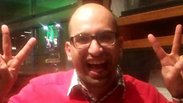
Steven Salaita: BDS’s favorite martyr
Op-ed: American scholar's repeated insistence that academic freedom does not apply to 'pro-Palestinian' voices is simply absurd, as both overt hostility to Israel and anti-Semitism under the guise of anti-Zionism have for years dominated field of Middle East studies.
The lecture was co-sponsored by Jewish Voice for Peace, which the Anti-Defamation League calls "the largest and most influential Jewish anti-Zionist group" in the United States.
An audience of about 40 attended the rambling lecture at the Wooden Shoe, a dingy, dirty anarchist bookstore that sported pro-Boycott/Divestment/Sanction (BDS) and other far left propaganda, including a poster of the brutal Marxist killer Che Guevara.
Salaita’s claim to fame rests on UIUC’s 2014 decision not to install him as a professor of Native American studies. He and UIUC announced a settlement on November 12 that awards him $600,000 and legal costs; he will not seek or accept employment at the university.
Despite his ostensible field of specialty, the bulk of Salaita’s work consists of attacks on Israel, often under the guise of comparative history. It will surprise no one familiar with Salaita’s ideas that his most cited work, "The Holy Land in Transit," which offers a "comparative analysis" of Native Americans and Palestinians, portrays American colonists, ancient Hebrews, and modern Israelis as brutal colonial settlers who engaged in genocide.
Now ensconced as the Edward W. Said Chair of American Studies at the American University of Beirut (AUB) for the 2015/16 academic year, Salaita told his Philadelphia fans that he is someone "who just got fired" because academe is not really about "true" academic freedom. Were this not the case, he could not have fallen prey to the "Zionist lobby."
He proceeded to mock and mispronounce the names of pro-Israel philanthropists Haim Saban and Sheldon Adelson. To great applause, he described as "kickassery" the efforts of Students for Justice in Palestine (SJP), Faculty for Palestine, and other pro-BDS groups who publicly defended him and lauded Jewish Voice for Peace for their PR work on his behalf.
Settling into what is clearly a well-worn routine, Salaita claimed that while he won’t be the last victim of the lobby, "the Zionists have lost the argument in the public sphere – it’s done," so he and his groupies can win the hearts and minds of the American public.
He said that his case represented the point at which all oppressed groups could unite and proclaim, "F— this! We have been put down long enough and we are not going to be afraid to utter the word Palestine."
Moreover, he asserted that "academic freedom never fulfilled its inherit promise" because it doesn’t allow for individuals like himself to express their views. Institutions pressured by Zionists are criminalizing his views, which he claims - against all evidence - are "scholarly" and "objective."
The enthusiastic audience hung on every hackneyed cliché Salaita fed them, especially his repeated attacks against Zionists, whose actions he deemed so indefensible that they must resort to the purely defensive tactic of deflection.
He added, mendaciously and mockingly, "You will never find a group of people who love China and Tibet more than the Zionists." He is obsessed with Jews, and his phraseology revolves around "Zionists" as connoting an anti-Semitic trope and not merely Israel, whose legality as a nation state he persistently downplays and questions.
Salaita’s alleged martyrdom is the subject of his newest book, "Uncivil Rites: Palestine and the Limits of Academic Freedom." Yet his repeated insistence that academic freedom does not apply to "pro-Palestinian" voices is simply absurd.
Both overt hostility to Israel and anti-Semitism under the guise of anti-Zionism have for years dominated the field of Middle East studies, a fact illustrated by the standing ovation Salaita received at the 2014 annual conference of the Middle East Studies Association (MESA), which also voted to affirm the right of individuals and organizations - including MESA - to support BDS resolutions.
Salaita’s meteoric rise as a left-wing cause célèbre rests precisely on his vitriolic views, grounded as they are in anti-Semitic conspiracy mongering rather than rigorous, objective scholarship. No one has a "right" to tenure, nor to freedom from the consequences of his behavior.
When professors who substitute agitprop and rank propaganda for scholarship are seen for the charlatans they are rather than the principled victims they pretend to be, academe can start down the long road to reclaiming its integrity.
Asaf Romirowsky is executive director of Scholars for Peace in the Middle East (SPME) and a research fellow at the Middle East Forum. The essay was written for Campus Watch, a project of the Middle East Forum.










